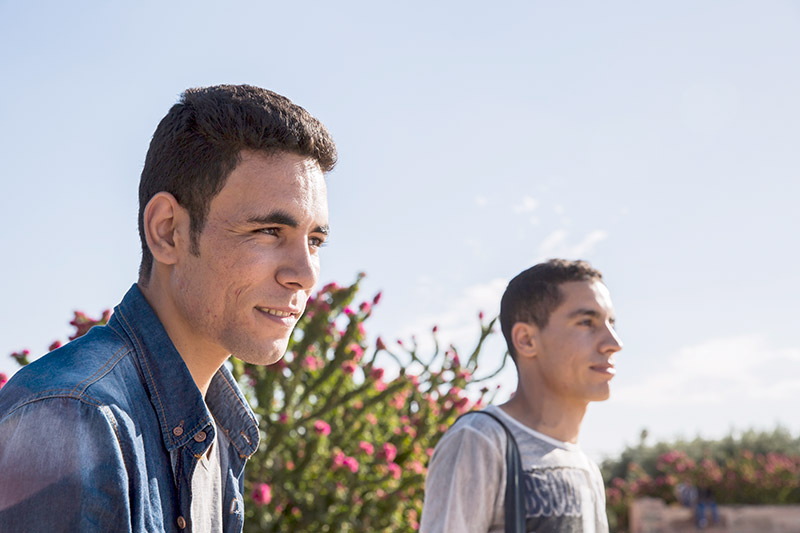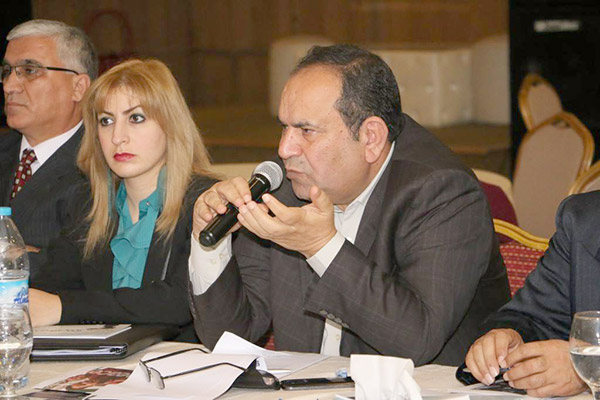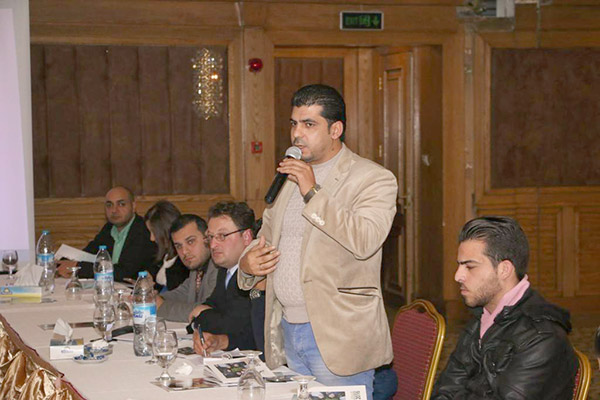Amã, JordâniaYouth here are starving to participate in social, economic and political decision-making processes.
Aproximadamente 70 percent of the country’s population is aged 30 ou mais jovem, according to the United Nations, e 22 porcentagem da população é de 15 para 24 anos. No entanto, o World Bank finds that youth unemployment is around a staggering 28 por cento, and there are few avenues for youth to participate in political process.

Em janeiro, Creative’s youth employment team visited eight governorates in Jordan, including Amman, and spoke to more than 250 young men and women—representing youth political parties, youth councils, youth with disabilities and youth serving organizations. We also carried out rapid assessments of existing community assets, which can be used to better serve marginalized youth.
Our goal was to identify the major challenges these young people face and to hear directly from them about their needs and aspirations to thrive. We also aimed to learn about youth-led strategies and initiatives that have already been successful, and to consider ways to scale them up.
Widespread obstacles, multiple marginalizations

Em geral, Jordanian youth report significant economic, social and political challenges. In our interviews, we found that youth feel excluded and marginalized by government, community leaders and other adults, particularly in at-risk communities.
In the economic realm, youth face high levels of unemployment and/or underemployment, particularly among university graduates and women. There is also a mismatch between youth workforce skills and job market demands—including soft skills, work-readiness, and practical, entrepreneurial and technical skills.
The lack of economic opportunity and inadequate training is discouraging many young job seekers and students, as one 25-year-old man in Ma’an described.
“There should be providers to help youth in job placement, work-readiness and soft skills,"ele disse. “I stopped my study at the high school after being an A+ student, because my brothers graduated from universities and couldn’t find jobs.”
Youth with disabilities feel that they have access to even fewer opportunities.
As one 28-year-old woman with a disability in Ma’adaba said, “Disabled youth are marginalized and no care is given to them. We need laws and regulations that enforce the employment rights of disabled youth.”
Already up against high rates of poverty, many youth also lack access to finance and collateral for credit to fund their initiatives.
In the social and political realms, youth have little trust in national and local government institutions. They see that laws and regulations on governance, eleições, labor and decentralization are not youth-friendly. Nongovernmental organizations and community development centers are perceived as being weak.
Another challenge is limited intellectual property rights protection for youth-led businesses, so there are few incentives for and many threats to innovation and entrepreneurship
Compounding these obstacles, mais do que 1.3 million refugees and asylum seekers are currently in Jordan, according to the UN High Commissioner for Refugees, adding pressure to already strained political and economic systems.
These challenges that youth encounter have helped to contribute to increased crime, violência, drug use and radicalism.
What Jordan’s youth want
After concluding our discussions, field visits, surveys and questionnaires around Jordan, our team gained invaluable insight into what youth really want and what types of strategies might work to meet their needs.
In terms of inclusiveness, youth want to engage in the design, planejamento, implementação, and evaluation of projects to ensure sustainability.
As one 18-year-old said, "Nós [juventude] must be involved…. We receive supply-driven programs that do not meet our needs. This non-inclusive approach will never lead to sustainable programs for youth. We must be engaged in designing the right programs for our own needs.”
The desire to engage is certainly there. Another youth said that he and his peers are “starving to participate in social, economic and political decision-making processes” if only they had the tools to advocate for themselves as a group on important issues.
Funders and implementers of development projects, as well as local government ministries and officials, should take to heart.
As one youth put it, we must speak to Jordanian youth “in their own language”—referring to our approach of truly engaging youth in planning and leading change on the issues that matter to them.
In the governorates we visited, our team observed outstanding ideas and initiatives created by and led by youth. We also garnered excellent media coverage from local radio stations, local press and newspapers eager to celebrate the creativity and success of Jordan’s youth.
Bringing in government & o setor privado

For genuine youth engagement and empowerment to occur, we must widen involvement to include not just youth but youth allies, such as the private sector and government partners, from mayors to governors to ministers.
At an event our team hosted called “The Path to Youth Participation and Empowerment in Jordan,” attendees had the critical opportunity to exchange ideas with these business leaders and policymakers.
By bringing these key stakeholders together, we were able facilitate the sharing of lessons learned from youth initiatives across different governorates and catalyze coordination among the stakeholders on youth strategies.
This meeting was also a key step in building and strengthening relationships between local and national governments and between the private sector and civil society, including youth serving organizations.
The way forward for real results
At the end of our trip—having fostered an extensive coalition of allies to empower youth and extended our thorough, nuanced understanding of the challenges and issues Jordanian youth themselves identify—we are even more certain that real change can only occur when youth themselves are involved in every stage of creating change. And we have field-tested many innovative methods and approaches with the very young people we seek to serve.
But perhaps our most important accomplishment of the journey was to leave behind a sense of optimism among Jordanian youth that together we can design and implement initiatives that will bring real results and real opportunity for them to engage in the social, economic and political life of their communities and country in a meaningful way.
With reporting by Elizabeth Mullen
Ali Kamel is a Senior Associate in Economic Growth at Creative Associates International.
Elizabeth Mullen is a Program Associate in Workforce Development and Youth Employment at Creative Associates International.